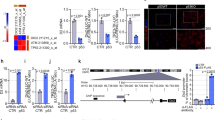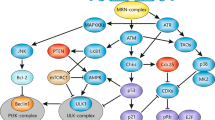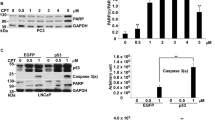Abstract
To understand the effects of ionizing radiation on thyroid cells, we investigated the role of p53 in mediating apoptosis and in DNA repair following in vivo and in vitro irradiation of thyroid cells. In vitro exposure of human thyroid cells to ionizing radiation of up to 5 – 8 Gy failed to induce apoptosis in primary cells. The same results were obtained when the thyroid gland was irradiated in the intact rat. To explore the mechanism of failure of the wild-type p53 in inducing apoptosis in thyroid cells, we investigated the expression of apoptosis-related genes, bax, bcl-2 and fas/APO-1 following irradiation or induction of temperature-sensitive p53. The expression of Bax, Bcl-2 and Fas/APO-1 in human primary cultured thyroid cells did not change after irradiation. To further confirm the results, we established a clonal cell line (tsFRO) in which a temperature sensitive p53 (Val138) expression vector was stably transfected to a thyroid carcinoma cell line lacking endogenous p53. Incubation of tsFRO cells at the permissive temperature for three days, however, did not induce apoptosis although G1 arrest was noted. Although enhanced expression of the bax mRNA level was observed, the expression of Bax, Bcl-2 and Fas/APO-1 protein did not change by shifting tsFRO cells to permissive temperature as well as irradiated primary cells. Furthermore, DNA end-jointing ability was examined by transfection of linearized luciferase plasmid into tsFRO cells. Increased luciferase activity occurred when the cells were cultured at the permissive temperature, indicating that the wild-type p53 enhances DNA end-jointing activity. Our results indicate that the wild-type p53 does not lead to apoptosis but facilitates DNA end-jointing in thyroid cells. These results may reflect specific responses in thyroid cells following irradiation.
This is a preview of subscription content, access via your institution
Access options
Subscribe to this journal
Receive 50 print issues and online access
$259.00 per year
only $5.18 per issue
Buy this article
- Purchase on Springer Link
- Instant access to full article PDF
Prices may be subject to local taxes which are calculated during checkout
Similar content being viewed by others
Author information
Authors and Affiliations
Rights and permissions
About this article
Cite this article
Yang, Tt., Namba, H., Hara, T. et al. p53 induced by ionizing radiation mediates DNA end-jointing activity, but not apoptosis of thryroid cells. Oncogene 14, 1511–1519 (1997). https://doi.org/10.1038/sj.onc.1200979
Received:
Revised:
Accepted:
Issue Date:
DOI: https://doi.org/10.1038/sj.onc.1200979
Keywords
This article is cited by
-
The Novel 5-Fluorouracil Loaded Ruthenium-based Nanocarriers Enhanced Anticancer and Apoptotic Efficiency while Reducing Multidrug Resistance in Colorectal Cancer Cells
Journal of Fluorescence (2023)
-
Synthesis and Anticancerogenic Effect of New Generation Ruthenium-Based Nanoparticle from Homalothecium sericeum with Eco-Friendly Method
Journal of Pharmaceutical Innovation (2023)
-
Induction and inhibition of the pan-nuclear gamma-H2AX response in resting human peripheral blood lymphocytes after X-ray irradiation
Cell Death Discovery (2016)
-
The role of DNA damage responses in p53 biology
Archives of Toxicology (2015)
-
Radioiodide induces apoptosis in human thyroid tissue in culture
Endocrine (2013)



